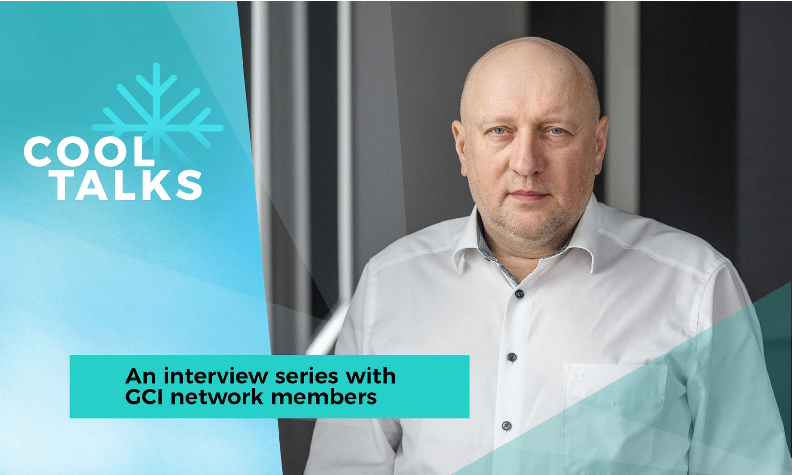For this Cool Talk, we have had the opportunity to interview Rytis Bernatonis, CEO of Freor. He began his career as an engineer 30 years ago and has always found manufacturing and its process fascinating. Almost 20 years ago he started FREOR LT, UAB, which today offers a complete range of commercial refrigeration equipment, including cabinets, serve-overs, and freezers, along with innovative, energy-efficient, and, most importantly, environmentally friendly cooling systems.
Why joining the Green Cooling Initiative?
As a business in the refrigeration sector, we recognize the significant ecological issue of climate change and the potential impact we, as a sector, can have on the environment. Our manufactured refrigeration equipment operate on green gas refrigerants R290 and R744. These technologies are a sign of our commitment to be part of the climate change solution instead of a cause. We continuously improve our equipment's energy efficiency, quality, and durability. Therefore, there are stores we equipped 15 years ago with refrigeration equipment that they still are in use today. We genuinely care about the environment and see the Green Cooling Initiative as a great platform to share our refrigeration solutions for a better future.
How does your company contribute to making the RAC sector more climate-friendly? / Why are you committed to green cooling technologies?
In 2015, we were one of the pioneers in developing eco-friendly refrigeration equipment that runs on propane, aiming to positively impact the refrigeration sector. We firmly believe in this technology and have been promoting it ever since, as well as CO2 (R744) refrigerant. Recognizing the importance of energy usage for both customers and the environment, we offer an energy-efficient Hydroloop cooling system that additionally allows excess heat to be reused for heating the store premises or water. Our latest innovation is the Continuous Cooling technology, which can be used with any R290-driven refrigeration equipment and can save up to 70% more energy when paired with the Hydroloop system, resulting in a significant environmental impact. Finally, we manufacture high-quality, durable refrigeration equipment.
Where do you see the biggest obstacle for green cooling technologies at the moment?
As a company that mainly focuses on propane-driven refrigeration, based on our experience and conducted tests, we know and believe that propane is the answer for green cooling technologies. Unfortunately, to this day, many people are still misled by its flammability and danger, which is a huge step back. It is important to inform people and keep talking about it since the benefits propane bring to the sector are much bigger than any improbable danger it might bring. The approval by the European Union to increase the propane charge limit for one closed cycle up to 494 grams in refrigeration equipment is a clear indication of the growing recognition of propane as a reliable, eco-friendly, and, most importantly, safe option for cooling solutions.
What would an ideal cooling sector look like in the future?
As we move forward, achieving a balance between the significant need for refrigeration equipment and the crucial responsibility of preserving our environment and saving the planet for future generations should be our ultimate goal for the cooling industry. Our team believes using propane gas as a refrigerant is the solution to achieving this balance.
What makes you believe that we will master the transition to Green Cooling?
People. It's encouraging to see that more and more people are becoming increasingly more conscious of the environmental impact of their businesses and are actively seeking more sustainable options. We see a slow transition to a brighter future, whether this be due to legal regulations such as the HFC phase-down, EU F-Gas Regulations, or all initiatives like the Green Cooling. We are pleased to see our clients expressing interest in green cooling solutions. We are delighted to provide environmentally friendly cooling options to our clients, and their choice to prioritize sustainability keeps us optimistic.
Speaking of safety: what would you say to people who think natural refrigerants are too risky to handle?
Regarding R290, itis worth noting that our typical portable stoves or barbeques tend to have a higher amount of propane gas than refrigeration equipment. Nevertheless, we feel comfortable using these products independently but are scared of choosing propane-driven refrigeration equipment that professionals always handle and install.




